Let’s define what are the main differences in B2B vs B2C marketing. Nowadays you can find many diverse articles on the internet about marketing and what is working and what is not. Finding the real stuff can be hard especially when you do not know where to start.
So, whether you are a professional marketer working or an owner of a business, let me give you the 10 most important differences in B2B vs B2C marketing that you actually need to know before you create your first marketing strategy.
Before we start, I would like to also address marketers who are transitioning from b2c to b2b and otherwise, as it is different and your way how to convert people is not similar as you do in B2B or B2C Marketing. So, I hope this article will show you where you will need to make some changes in your way how you attract people to the business.
But I am not saying you should totally forget about what you have learned in B2B or B2C marketing as coming with a fresh look and ideas on how to tweak and improve your marketing can bring valuable insights and also differentiate you from competitors.
So, let’s dive in!
What is B2B Marketing?
B2B marketing is a short form of business-to-business marketing. This type of marketing occurs when a business is selling products and services to another company and not an individual.
The company which is buying the product or/and services does not need to be necessarily involved in business-to-business deals, and they can be selling to people, but they just buying the products and not selling.
The company that is selling products and services is mainly focusing on businesses. And by “mainly” I mean that’s their main source of income, revenue from other businesses which bought the product or/and service.
Still, that means, the business can be providing some products and services to consumers as well.
So, what does it mean to you?
You as a marketer have a certain B2B targeted audience to who you can offer your company products and services to other companies.
That means you would be focusing on and targeting other companies and not consumers. Of course, some people would be deciding whether you can solve their problems. Usually, it is around 7 people who would be evaluating your products and services.
Examples of Business-to-Business Companies
Look at some examples of what business to business companies are doing and what is making them different from B2C businesses.
A great example of B2B business is Alibaba, where businesses can easily find suppliers and manufacturers mainly from China to produce their products.
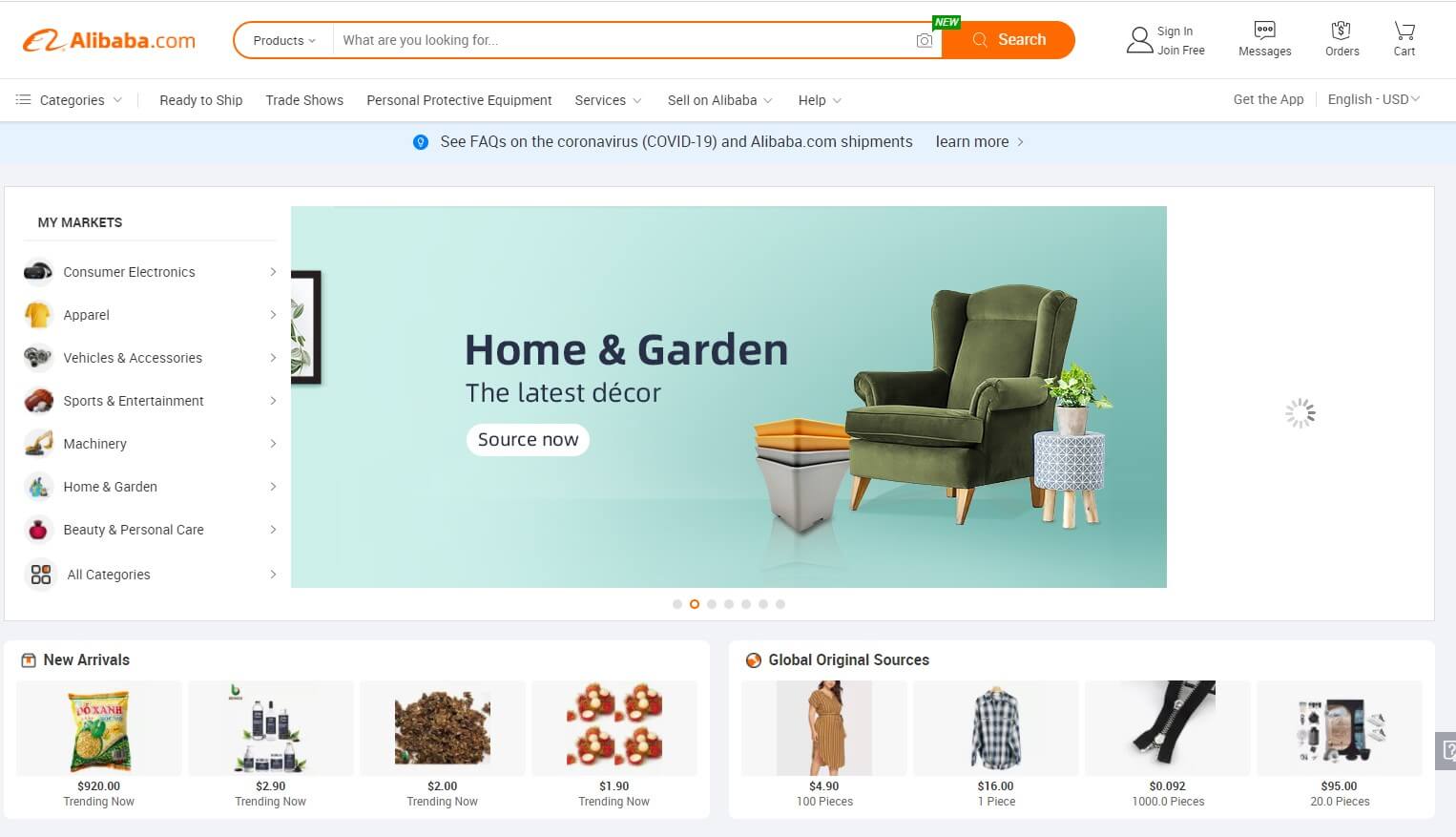
Another great example of a business to a business company is Microsoft Dynamics 365 that is selling ERP and CRM applications to businesses around the world.
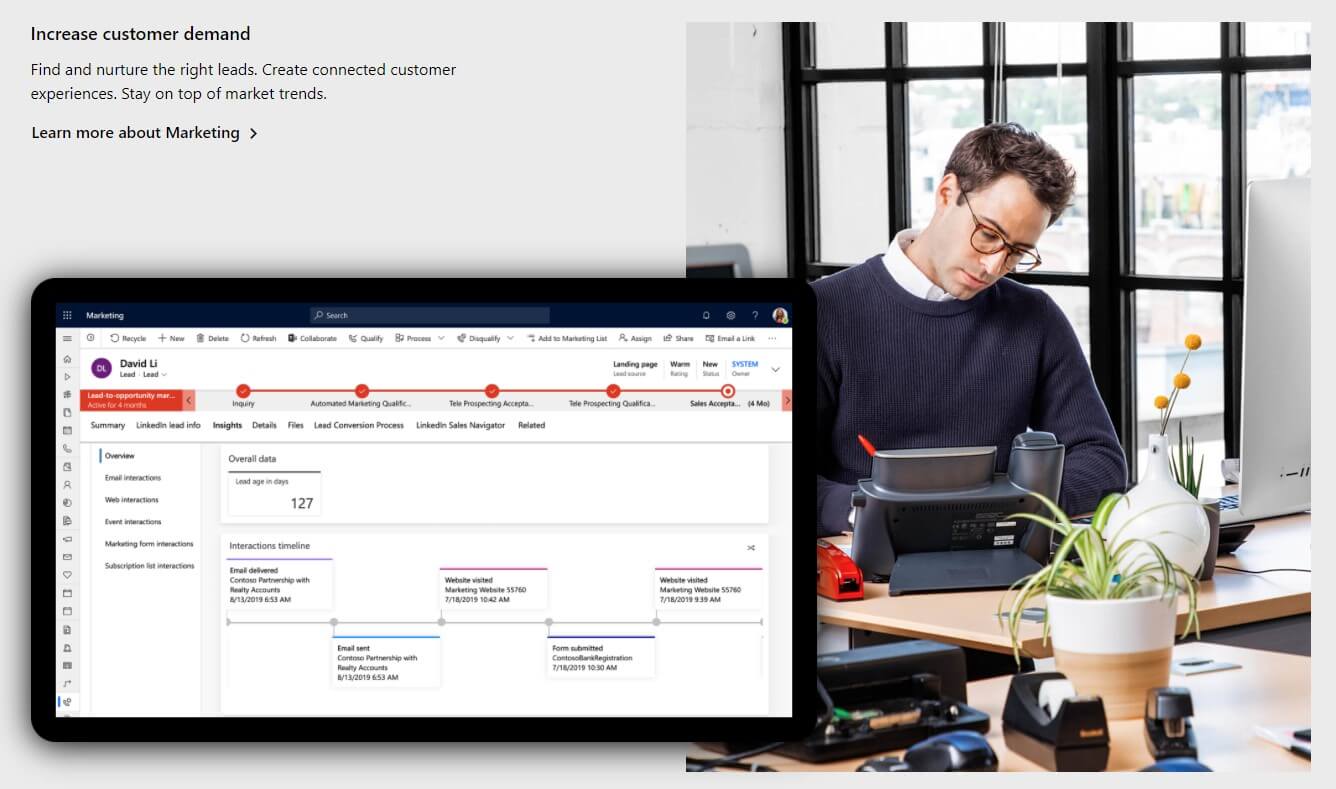
And If you love to read books you probably know your local bookstore or amazon. So, this one is similar, but for business to business. My favorite, BulkbBookStore!
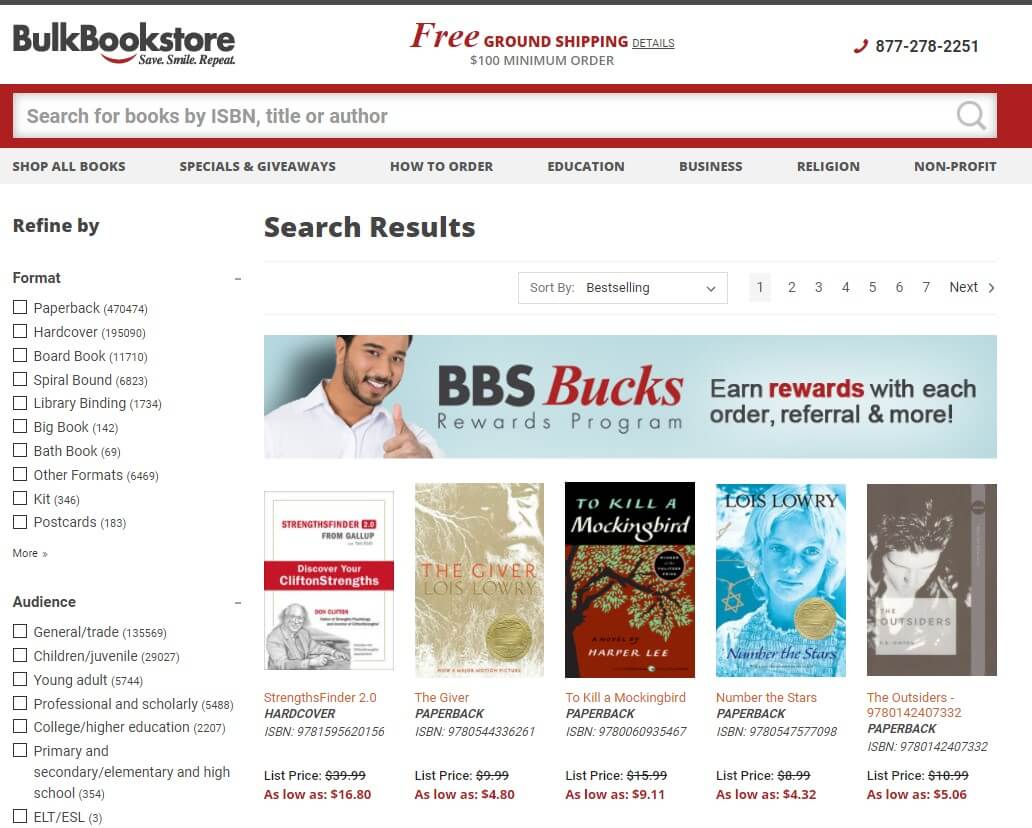
What is B2C Marketing?
B2C is a short form for business to consumer. Business to consumer is when you are, or your company is selling products and services to individuals. By individuals I mean not only 1 person, but it can be a family or and group of people like friends.
For example, if you are buying beers for friends when you are organizing a party that is still in the category of business to consumer. The consumer is not just one person.
To explain it better, these products and services are for everyday life for you and me to buy and use. Like for example a car, a fridge or food.
So, for you as a marketer in B2C, you are mainly focusing on promoting goods and also services to consumers.
This gives you already a different target audience from business to business. This also refers to your tactics and strategies you would be using to attract people to buy your product and services.
Examples of Business to Consumer Companies.
Amazon is one of the largest business to consumer company in the world. But for some, an Amazon is also a B2B business. If you are a reseller then your Amazon is a B2B business for you. But mainly Amazon is known for its B2C offerings.
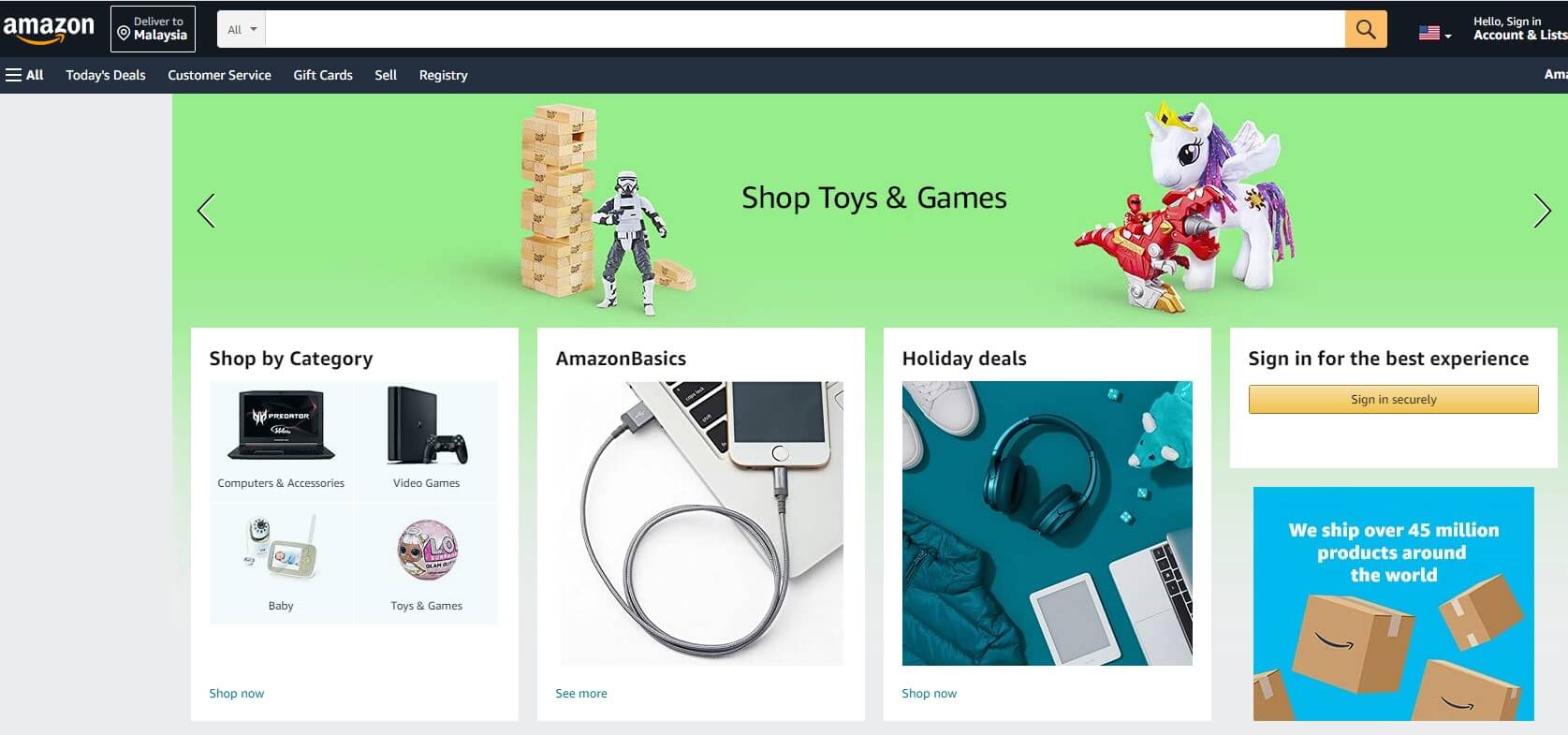
Another great example is Walmart is as well one of the largest companies in the business to consumer industry.
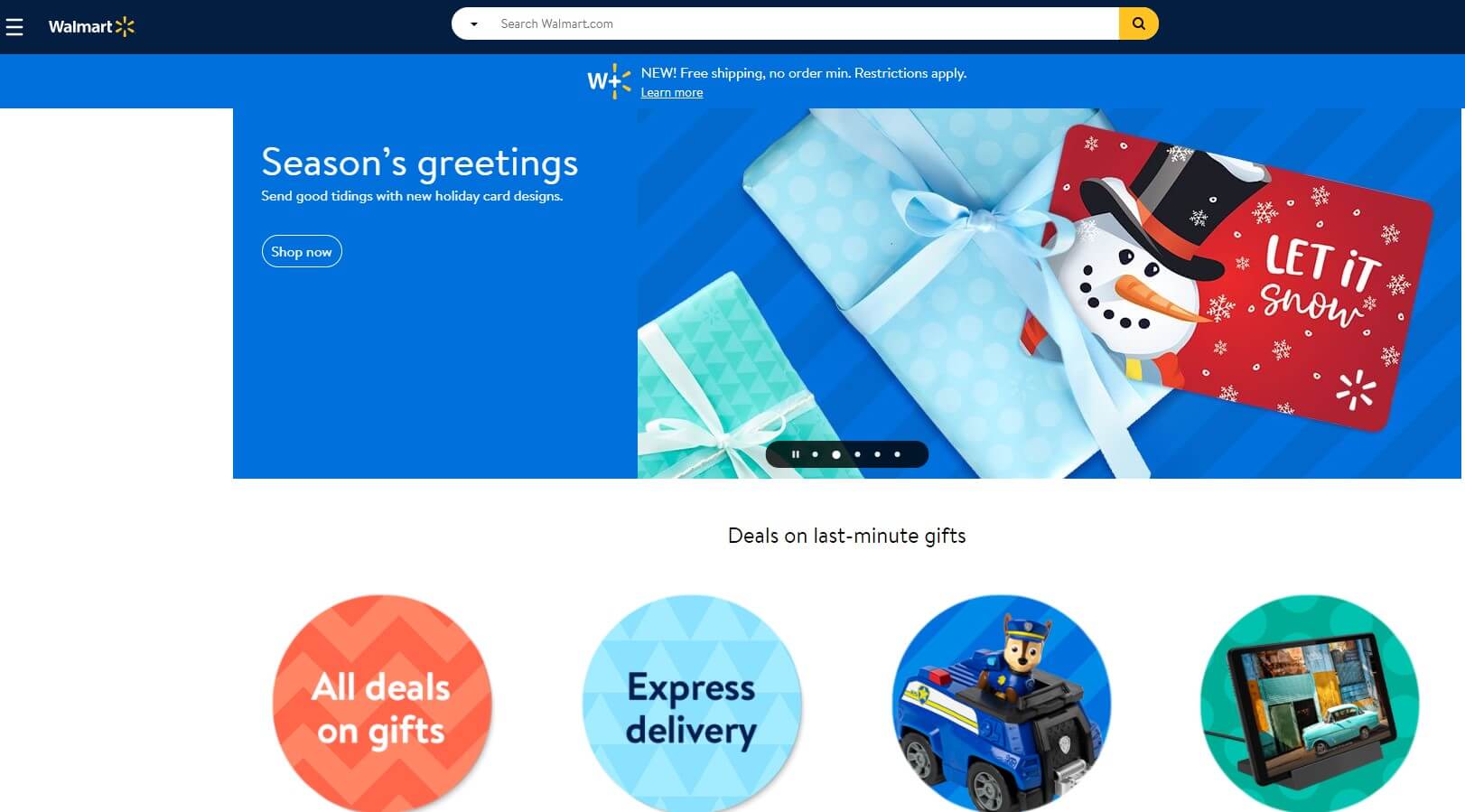
Clean Cut Gardening Services are a great example of services in the business to the customer sector.
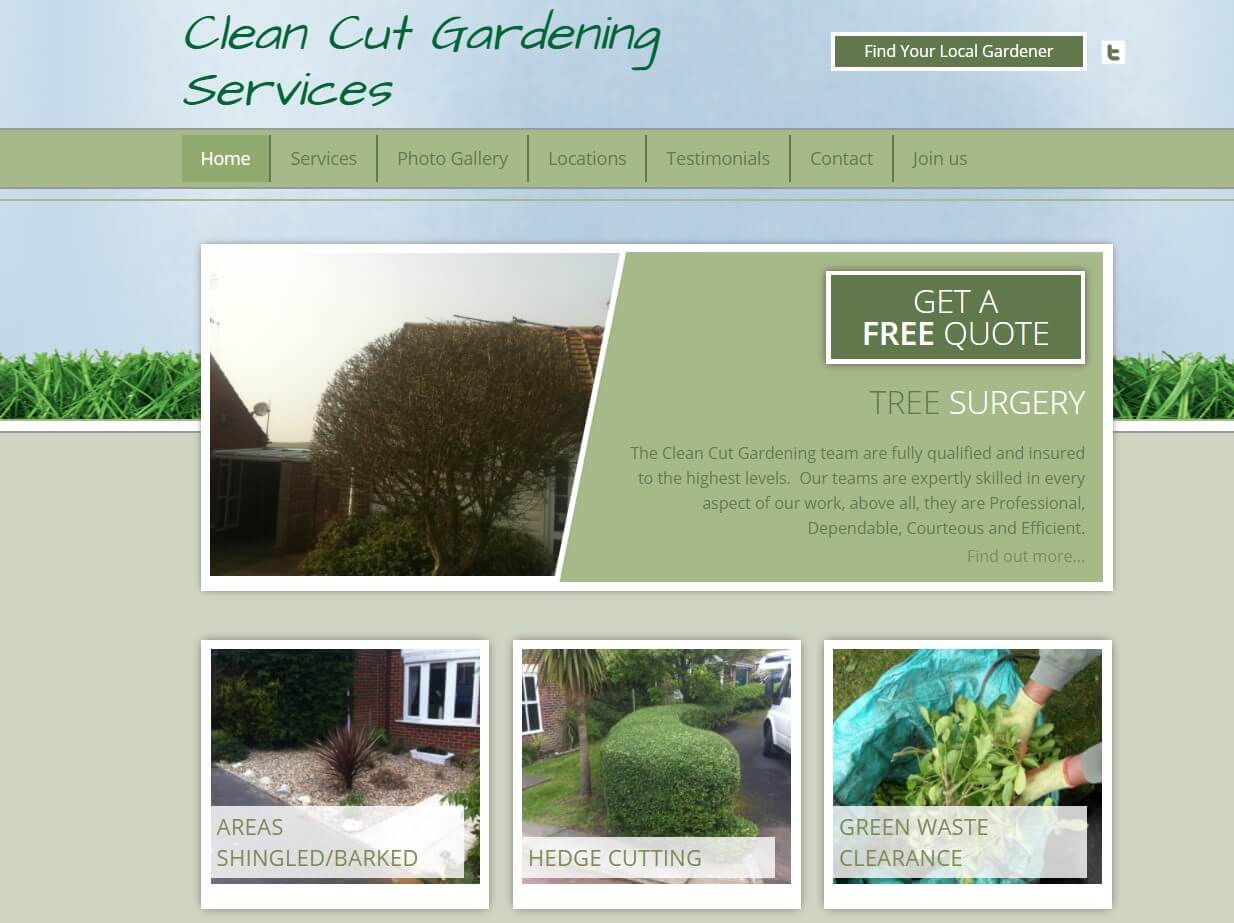
1. Target Audience & Personals
The first difference between B2B and B2C Marketing I want to mention is the target audience and personas you must target to attract high-quality leads and sales to your website.
Every good B2C or B2B marketing strategy starts with knowing who you are targeting and what you want them to do. Understanding your target audience is an essential key to successfully launch your marketing campaign.
And of course, there are considerable differences if you want to target the b2b target audience or the b2c target audience that affect the way how you must structure your marketing strategy.
Remember b2b target audience is always in the b2c target audience, but the b2c target audience is not always in the b2b target audience.
Why am I saying that? Because every influencer and decision-maker is a consumer as well, but not every consumer is a decision-maker or influencer in a company.
Target Audience with B2B Marketing
If you want to attract a target audience by using B2B Marketing, you first must focus on building relationships and trust with your target audience. Because they need to feel confident that you can solve their problems and needs. 70% of B2B buyers cite company reputation as the most influential factor when choosing which company to do business with.
Therefore, building thought leadership, getting awards, participate in industry events is essential to show you are trusted and an expert within your industry.
This means you must share expertise with your b2b target audience and focus more on the rational and logical part of them. Thus, providing educational content, reports, case studies, demos, and other materials to show how your solution works and not give only blind promises.
Also, your B2B marketing strategy should be focused on a niche market and provide more personalized and targeted messaging. Because b2b target audience searching for specific solutions to solve their exact pains and needs.
The same you are targeting only a very narrow and specific group of people. E.g., If you are selling B2B SEO software for SMB, then your target audience will be most likely only marketing decision-makers within SMBs.
Lastly, B2B selling cycles are typically much longer. B2B sales cycle is more likely to fall between 6 to 9 months.
Target Audience with B2C Marketing
If you want to attract your target audience by using B2C SEO you first must focus on building awareness across the market and trying to spread your message across many people. As 63% of consumers need to hear company claims three to five times before they actually believe it.
Next for the B2C target audience, your messaging should be more focused on triggering emotions and quick emotional decisions that help them make decisions faster.
And because everybody is a consumer and almost every product has a lot of competition, focusing on large scale market across various industries is essential rather than niche-oriented.
Selling cycles are typically very short and purchasing decisions can be made very quickly depending on the price tag and other circumstances. But I have seen buying even more expensive stuff like TV, phones with a decision-making timeframe of a blink of an eye.
Also, the typical business to consumer targeting involves individuals and friends and families that have some connection emotion.
Thus, selling and marketing for B2C means that you must focus on triggering emotions that lead to quick purchasing decisions that we often regret, but love at the same time.
Infographic: B2B Target Audience vs B2C Target Audience
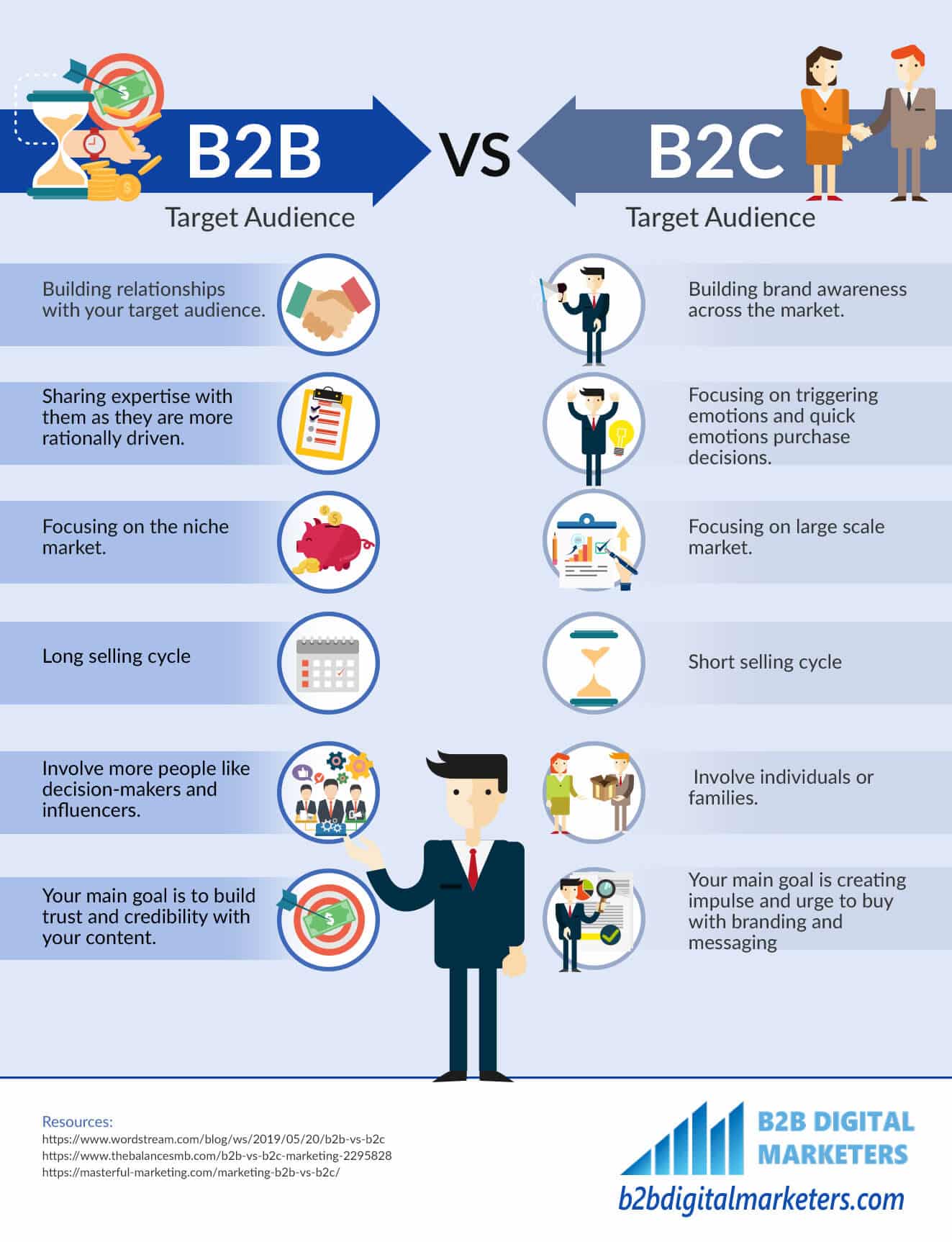
2. Content Marketing
The second difference between B2B vs B2C Marketing is the way how you create content to attract buyers or leads to your business.
Content marketing is important for any business whether you are in B2B or B2C but the goals and how you should structure and plan your content marketing will differ.
But of course, there are some similarities that both B2B and B2C content marketing strategies should have to successfully launch it like:
- Both contents strategies should be educational and valuable
- Both should be relevant to a target audience.
- Both should include data and emotional triggers
- Both need to provide positive ROI
Remember, that you are writing content for people, but different environments influence how we make purchase decisions. For example, Business environment, Being with friends and families, mood, season, and more are factors that contribute to our purchasing decisions.
Therefore, understanding how, when, what state and environment people making purchasing decisions for your products or services will help you to a better market.
BTW the differences I will mention are general, but the best marketers can take the best from both worlds and create super effective marketing strategies. Therefore, take time and think about how you can take some of those differences and apply them within your industry.
But let’s look at the differences between B2B and B2C content marketing:
B2B Content Marketing
When you are creating B2B Content Marketing you should always understand your customers and buyer journey as creating content for b2b buyers means you must align your content marketing to create a seamless customer journey.
The reason behind this is because due to the internet b2b buyers are having almost unlimited sources of information for them to make a purchasing decision.
According to Blue Corona, 62% of buyers say they can make a business decision based on online content alone.
And over 80% of b2b buyers view at least 5 pieces of content during the purchase processes and half of them view more than 8 pieces.
This means that the online content has a great potential to bring more leads, but you must align your content marketing effort across multiple channels to lead your prospects to the bottom of the funnel by providing content that they need to make the purchasing decision.
Thus, you must understand what type of content, whether it is social media posts, emails, webinars, events, case studies, etc. you need to create for each stage of the buyer journey to help and educate your b2b prospects along the way.
And a very important part of each piece of your content must help establish credibility, build expertise and trust with your target audience, and everything you do you should always ask yourself, “Does this increase trust and credibility?”, this is very important!
B2C Content Marketing
When you want to create b2c content marketing your goal is to address a large audience, like mothers, dog owners, people that are sick, etc. but at the same time, it must be personalized that you are talking to them directly and not the masses.
So, the content on your website, social media, and every other piece of content that you create should be targeted but connect more on emotional levels.
Thus, creating a B2C content marketing strategy can be more playful, entertaining, and friendly as you want to connect more on emotional levels with your target audience.
Therefore, many successful b2c content marketing campaigns include stories that trigger emotions and the best example of such these can be found within every Apple’s marketing copy for every new product they launch.
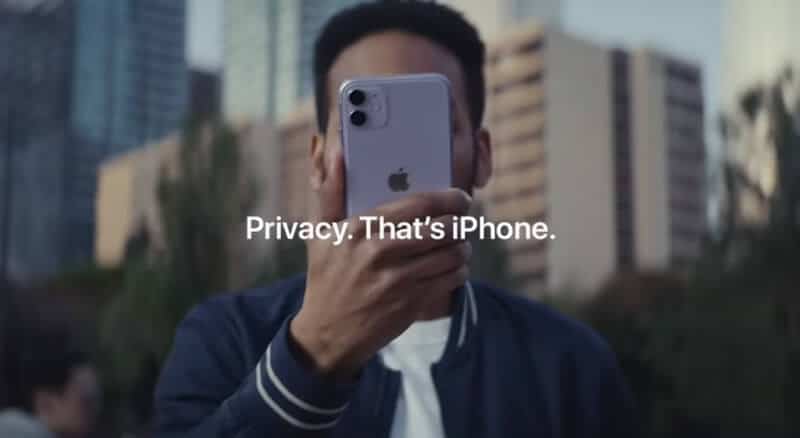
Of course, you cannot just based on stories and you must provide some proofs and data for your product because saying you are the best means nothing. Because if you say it, they do not believe it, but if someone else says it, they believe it. (How to Win Friends and Influence People – Dale Carnegie)
But please remember, these are not rules of b2b and b2c content marketing and you shouldn’t strictly follow these because as I said, the most successful marketers learn from both and apply it to their marketing strategies.
3. Keyword Research
Keyword research is the essential key to every SEO strategy, whether in B2B or B2C industry that will help you to target the right audience.
As mentioned for both, you must understand your target audience to effectively market, and the same applies to your keyword research for B2B vs B2C marketing.
Both buyers are using search engines to research for products and services and if you want to appear there you must target the right keywords your buyers are using when searching for your products or services.
Thus, first, you must conduct keyword research to find those keywords that B2B and B2C buyers are using to find your products and services.
This is when marketing funnels are helpful to better understand how your buyers are searching and making purchasing decisions
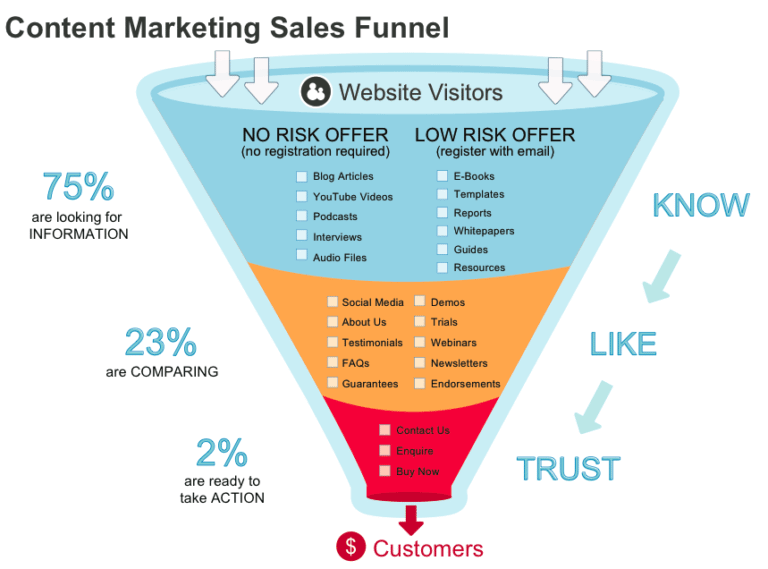
And this is fundamentally the same to do keyword research for B2B and B2C organizations, as you must search keywords that:
- Brings conversions,
- Generates brand awareness
- Helps during the consideration stage
And there are many ways how you can find keywords, but the fastest way is to use SEO tools like SEMrush or SE Ranking.
4. Advertising
The biggest misconception about marketing is that advertising for B2B and B2C is the same but that is wrong because B2B and B2C see conversions in different ways.
But advertising is super important for both industries.
And on top of that, marketers using both organic SEO strategies and search engine marketing like pay-per-click ads see an average of 25% more clicks and 27% more profits compared to using a single strategy.
Both B2B and B2C industries are using advertising on search engines, social media, and other channels to drive lead generation to their businesses, and because using search engine marketing is an important part of lead generation strategies both B2B and B2C spend a lot of money on advertising.
But driving leads for a B2B organization is different than driving leads for a B2C company, both marketers are using a different set of tactics and strategies to drive leads generation for their companies.
B2B Advertising: Keep Options Open
Decision processes in B2B are usually more complicated and longer because more people are involved and with that more needs and pains are required to be solved and usually price tag is much higher.
Also, not everybody is ready to buy right away as it depends on where the prospects are in the customer journey. Therefore, it is important to keep options open to maximize the conversions of your landing pages.
And some might argue that including multiple offers can actually decrease conversions by as much as 266%, but from my experience that is not absolutely true, because I have seen an increasement in conversion rate by adding extra 1 or 2 offers like downloading free report or eBook.
The reason is that as I said, not everybody is ready to buy and B2B Conversions consists of micro-conversions which are conversions like downloading eBooks, subscribing to the newsletter, joining the webinar, etc.
Micro conversions are important for B2B because as I mentioned the customer journey is usually longer in B2B.
Therefore, using content upgrades, lead magnets and other strategies to get information like emails and names from prospects is essential as you can lead nurture those leads and increase conversion rate and bring more sales opportunities.
B2C Advertising: Be Straight Forward
The goal of advertising in B2C is to get conversions as soon as possible without any side actions or micro conversions. Rarely any company will offer eBooks, guides, and so on to get customers’ information. They rather provide coupons and discounts for people to register at their websites and make purchases.
Advertising as a B2C you must ensure that the user experience is perfect, with great loading time, because in B2C time is money and any friction during the purchasing process on a B2C website means losing revenue AKA time is money.
And because conversions and sales are happening really fast pushed by emotional triggers, in the B2C industry you most likely won’t spend so much time on getting to know your customers and the relationship is simply straightforward transactional.
So, if you are producing content like blogs where you are sharing your products and helping customers to make the right choice, your purchasing process from the blogs, purchasing on your website to delivery should be as smooth as possible.
5. Marketing Channels
Choosing marketing channels for B2B or B2C Marketing always depends on where your target audience is and that is why it can differ from what I am going to share with you.
There are plenty of marketing channels you can use and experiment with to see which marketing channel works for you the best and drives the best results for your business. That is why knowing where your target audience spends a lot of time will help you to find the right channels.
But these will be general marketing channels used by B2B and B2C organizations to attract their target audience and the differences between using these channels by B2B and B2C companies.
Social Media
The first channel used by both B2B and B2C organizations is social media channels like LinkedIn, Facebook, Instagram, or Twitter.
Using social media in marketing brings many opportunities for businesses to drive leads and conversions for their websites, but the tactic used can be different.
For B2B organizations using social media means just another step in the customer journey depending on where the prospect is. Therefore, using a multi funnel approach of sharing a mix of content like thought leadership, case studies, and product demos are essential to effectively drive leads from social media.
But for B2C organizations using social media is to attract new buyers that are sharing some similarities and showed interest in your products. Therefore, using coupons and discounts with limited time offers works great to get new customers.
Both companies can share thought leadership but generally thought leadership works great for B2B Organizations that are trying to first build trust with their audiences.
Email Marketing
Before we move on, I want to mention that email marketing is not dying and is widely used by marketers making still the top 3 most used and effective marketing channels to drive great results.
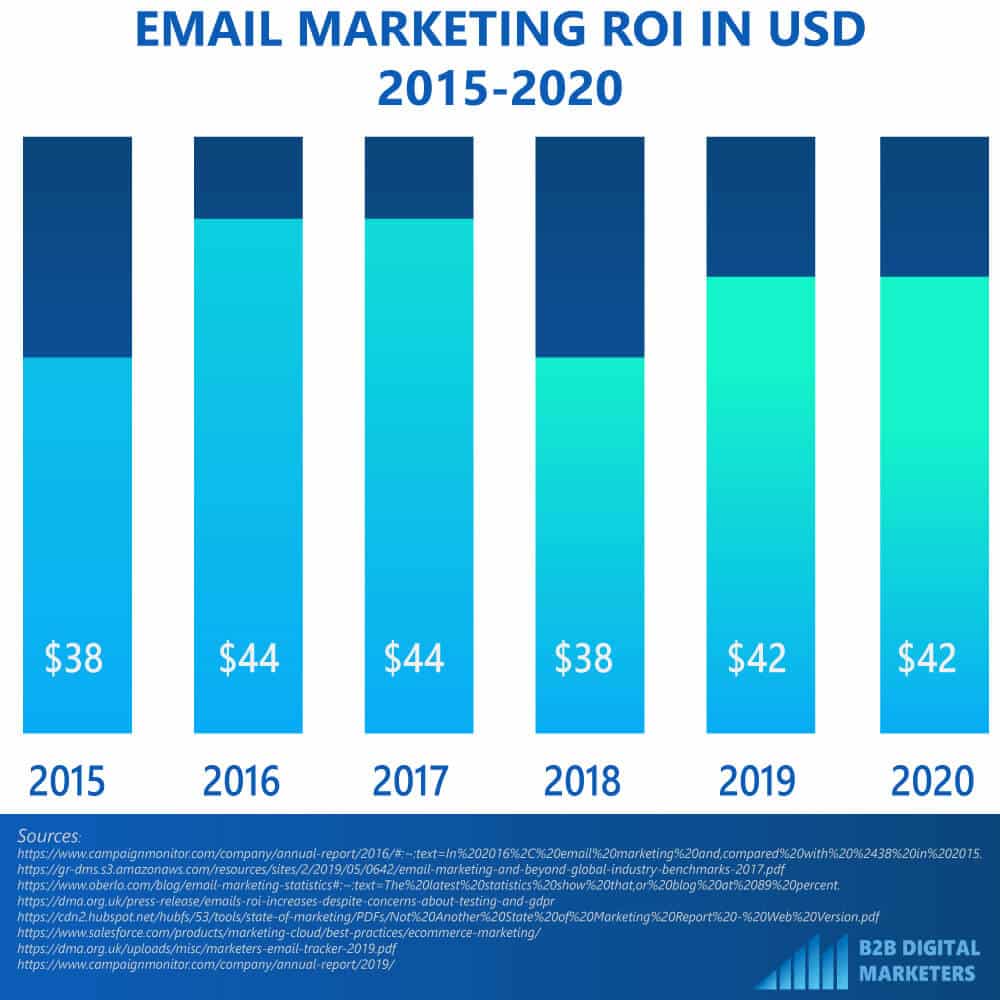
As you can see the email marketing strategy for over the past 6 years has been a strong marketing channel that consistently delivered an awesome ROI for marketers.
And according to predictions of Brian Dean email marketing makes a comeback even though it is an old-school marketing tactic. Thus, it is still well worth it to keep building your email marketing list whether you are B2B or B2C Organization.
But of course, there are differences in how you should use email marketing.
In B2B email marketing strategy works as a channel to lead nurture leads by educating and providing helpful information based on prospects’ information needs. The selling within emails is kept to a minimum as email marketing in B2B is just another channel to help buyers to learn more about your solution and satisfy their informational needs.
Therefore, it is a great channel to share your upcoming events, webinars, case studies, and other materials that make sense to share with your prospects to move them further in the B2B marketing funnel.
And in B2C email marketing strategy works as a channel to catch up with your previous buyers to showcase new promotions and product launches. Email marketing in B2C works perfectly to get quick sales, especially from previous customers.
In terms of designing, in the B2B email marketing strategy, the design is kept fairly simple with mostly text and links to other resources that prospects might be interested in. Of course, this should be personalized based on his or her interest.
On the other side, in B2C email marketing strategy, the design is much more complicated and well planned, making it very appealing. Rather than words, the design is doing most of the selling in B2C email marketing. Therefore, it is no wonder that B2C organizations invest a lot in email marketing design.
And lastly what makes email marketing strategy so effective is personalization. Both in B2B and B2C industry is important to spend some time create segmentation and personalization to effectively launch marketing campaigns.
Blog
It is clear that whether you are B2B or B2C organization you must be blogging to attract your target audience because just providing content like solution and service pages is not enough to bring high organic traffic for lead generation.
Both industries must be blogging to start generating meaningful and targeted organic traffic that is searching for your solutions and later can be converted. According to Demand Metrics, on average companies with blogs produce 67% more leads per month than those who do not.
But there are significant differences between blogging for B2B vs B2C marketing.
B2B blogging is based on facts and education as b2b buyers tend to be more logical when they are doing research. Therefore, providing educational content on how-to solve [pain points or needs] is one of the top drivers of organic traffic.
On the other side, B2C blogging is more based on stories to provide entertainment and triggering emotions as consumers are more likely to make emotional purchases, unlike B2B Buyers.
And because B2B blogging is based on more facts, stats and data, the blogs are usually longer than for B2C.
This comes to what I have said previously, while B2B organizations are heavily based on building trust and relationships with their target audience, B2C companies do not necessarily need to foster a consumer relationship the same way.
6. Brand Loyalty
Creating brand loyalty is one of the main aspects for businesses as proof that they are there for customers for a long. That is not just to buy from me, and I disappear right after the money is in the bank account.
Brand loyalty is very important when businesses searching for products and services as it usually means that once they buy from a company it has the potential for a long-term partnership.
When a business wants to buy something, it is usually expensive, and once is bought it is not that easily replaceable like in b2c consumers.
That means that whenever you are creating your copies and marketing strategy, think of how you can create or show that your company is loyal to its customers and provide trustable solutions.
In B2C, brand loyalty is something that is hard to keep as consumers can easily switch from one brand to another brand in just a few moments.
Deliver to your customers what you have promised is one thing but be there to support them after the purchase is another thing.
And because we are living in a time when consumers have all the power, due to high competition and they can easily to switch to another brand, providing after-sales customer support is essential to keep your customers.
In the B2B industry, the seller retains some of the power after the purchase, especially when the business is selling solutions that are hard to replace like machinery or business solutions.
But you should focus on how you can deliver a message to your prospects that your company is providing great support to its customers before even after the purchase.
For example, show that some of your customers are with you over a long period of time.
Because remember, businesses searching for a partner to buy and stay, not change them every time and brand loyalty is very important in business to the business industry.
7. Customer relationships
If somebody is buying expensive solutions from your company, they want to make sure, they are making the right decision. They need to trust the company that they will take care of them and deliver good quality products and services.
To get the trust of your prospects and customers you need to build relationships with them. Show them who you are and what you stand for. In the end, you still do business with humans and pure facts are just not enough.
That is why case studies are great in B2B Marketing as you can show expertise and build trust with your target audience. Like I said, provide proof that you are not just a company that once gets paid will disappear.
The same applies to B2C marketing because even consumers still want to make sure they are making the right decisions as about 95% of customers read reviews before making a purchase.
So, create relationships with your customers and do your best to provide the best customer experience.
According to Super Office.com, Customers no longer base their loyalty on price or product. Instead, they stay loyal to companies due to the experience they receive. If you cannot keep up with their increasing demands, your customers will leave you.
Maybe this does not sound like it does have nothing to do with marketing, but more with sales. But even to actually spend time on your website, click on your ads and read your copies requires trust from your users
So, you need to think about how you can actually create trust between you and your prospect so that they will give you their time whether you are in B2B or B2C.
8. Product Knowledge
Being an expert in the industry should be the main thing why your company is good but not always everybody is an expert. Unfortunately, for many marketers actually do not really understand their products or services the company is offering.
Because if you are one of those who does not know what they are promoting, then people will recognize it in your marketing and will not trust you.
And this is one of the biggest differences in B2B vs B2C Marketing as marketers in the B2B industry are required to have great knowledge about company solutions.
It has been proven that buyers are doing a lot of research before they actually jump into buying. Just think about it. If you are buying something expensive for your company, then you need to provide information on why you need it, and how it will help the company.
So, before you buy, you will conduct intensive research about the product you want to buy. You read a lot of articles, watch a video, and even buy books to make sure, you really understand your problem and how people solving it nowadays.
Decision-makers do really educate themselves before they approach you, and once they do, they will come up with pretty tough on-point questions. And in this stage, you cannot bullshit them because they have enough knowledge to recognize it.
That is why, if you have deep insights about your product, you will talk like that and promote it. They will recognize that this is your industry, and you can answer their questions like an expert.
Therefore, learn what you promote so you can speak like the experts and get prospects to trust that you know what you are doing.
9. Key Challenges
Every marketer whether B2B or B2C is facing many challenges that need to be address and another big difference between B2B vs B2C marketing is the challenges that each marketer is facing in the industry.
Nowadays marketers have to juggle across many different types of activities and channels to successfully drive demand for their business.
Because multichannel marketing and account-based marketing are becoming more significant to effectively market and provide relevant offers across all channels your target audience is located.
B2B and B2C marketers must adapt to the trends and requirements buyers have such as being able to connect with a company across any channel and get the same level of customer experience.
But here are some of the challenges that B2B vs B2C marketers are facing right now.
B2B Marketing Challenges: Experience, Expertise, and Knowledge
Definitely, one of the biggest challenges that B2B marketers are facing is the amount of knowledge they have to have to be able to create an effective content marketing strategy.
The thing is about B2B content marketing it needs to be done by experts as b2b buyers are searching for information and expertise during the research stage. But unfortunately, marketers are often not the ones.
And experts within the company are in different departments like senior management and they do not have time to continually provide content. Therefore, for B2B marketers the big challenge is to get hands-on the real experience they need to provide the thought leadership and content required by b2b buyers.
As I always say, if you want article on how to fix toilet, get a Plummer to write it. Because marketer will take the first 5-10 articles in search and write the article without the actual real knowledge. And that is not a thought leadership.
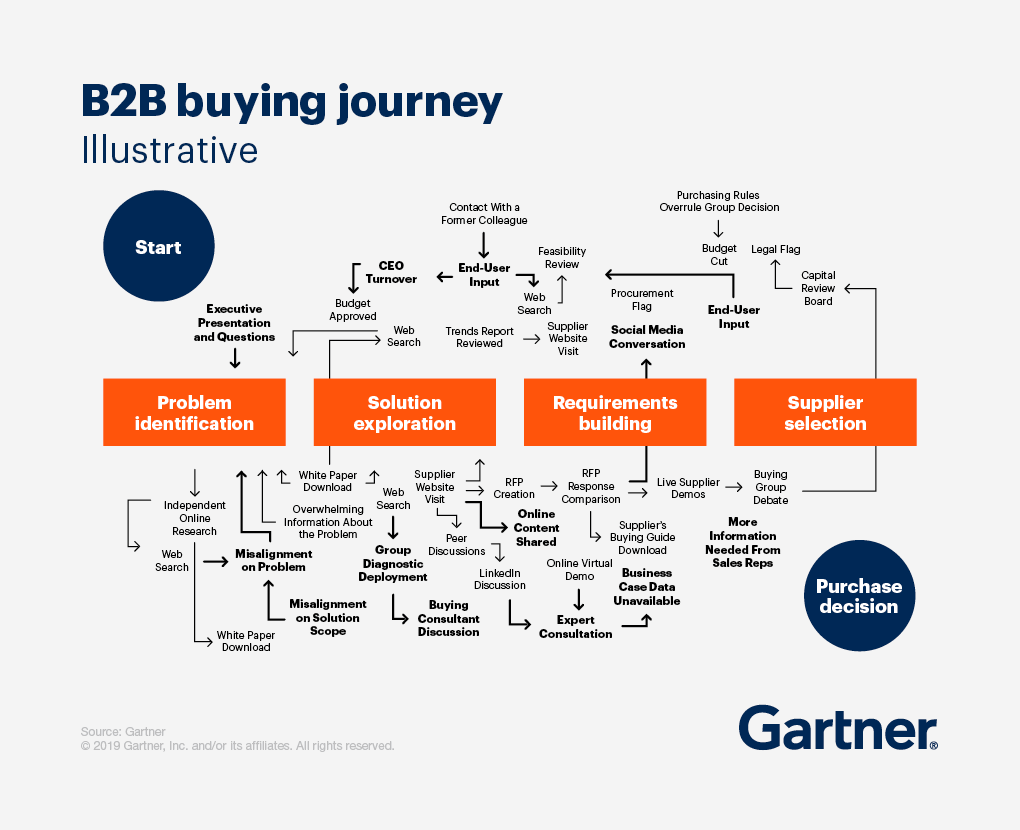
Another big challenge in B2B Marketing is providing the actual ROI of each marketing effort because the customer journey is not linear and as said by Gartner:
B2B buying doesn’t play out in any kind of predictable, linear order. Instead, customers engage in what one might call “looping” across a typical B2B purchase, revisiting each of those six buying jobs at least once.
Buying jobs don’t happen sequentially, but more or less simultaneously.
This means it is hard to really pinpoint what actually made your prospects request for a demo, sign up, or taking any other desired action.
That is why providing ROI to stakeholders is a big challenge in B2B marketing. Also, from this, we can see that to actually map a customer journey is challenging for b2b marketers as well.
B2C Marketing Challenges: Customer experience, Expectations
One of the biggest B2C Marketing challenges is providing constantly better customer experience as whenever your customer gets provided a better customer experience that is becoming a new normal for them.
And if you do not provide a higher level of experience, then they might get frustrated and go somewhere else. So definitely this is great challenge companies and marketers are facing right now.
Another big challenge B2C marketers are facing is a multichannel experience on mobile phones especially retail stores, because consumers are using the phone before, during, and after the visit to the retail store to evaluate products.
This makes it hard to keep up with consumers and provide relevant and useful information as often they get even more confused and might end up not buying anything.
10. The Decision Makers and Influencers
As I already explained, you need to know, who is your target the audience, so you can effectively attract them, but lets a bit more dive in about decision-makers.
The decision-makers are usually the c-levels or higher management who are making the final purchasing decision whether you will buy your product and service or your competitors.
This varies from your product and service but tries to focus, who are the people who would be using your product and service.
Let’s, for example, say, that you are selling financial software for accountants. That means mostly accountants will be using your product and CIO will be the one who is controlling and making sure the work is done properly.
CIO is the decision-maker, your targeted audience. But that doesn’t mean you will leave behind the accountants as they are the ones who will be using your product and also influence the decision-maker, or accountant manager would be influencing.
So focus on how you can create comprehensive marketing where you find a natural fit between decision-makers and influencers so both will find your product interesting and helpful for their needs and pains.
Remember, promoting to businesses involves many people and you need to explain to each of them why and how your product and services will solve the problem for them.
The Decision-Making Process
Business the business decision-making process is very different than in business to customer industry. Therefore, you should know how the decision-making process looks so you know how to engage with your prospects on each of the stages.
IDC research discovered that there are 3 stages when prospects become your customer. Each of the stages is vital for you as you should create pleasant interaction and experience for your prospect in each of the touchpoints/interactions with your company when you are attracting your prospect.
That being said, you should create different marketing materials for each of the stages as they are moving forward, they need always something new to become closer to buying decisions.
That is when you can influence your prospects to actually buy from you and present to them that your solution is the best. So read my comprehensive guide on how to create content for each of the stages that actually converts.
Remember, the buying process in business to business is much longer than in the business the consumer industry and the amount of information that is required is also much more as the stakes are higher and they need to make sure the decision is the best possible. Otherwise, they can lose their job.
Summary
Business to business takes much longer to convince a prospect to buy your product and services, often involving various types of digital marketing and digital marketing strategies. But if you focus on this key priority, you will create an honest and trustworthy company that prospects are happy to make a business for the long term.
Therefore if you are a new to digital marketing, then I recommend you to try any of these digital marketing courses to upskill yourself.
Remember, build relationships takes time but it can be broken very fasts. Make sure you are treating your customers right and you are always there for them whenever they need you. In the end, they put the trust in you, so make sure you don’t lose it.
Related Articles:
- B2B Digital Marketing Guide for Beginners
- Easy to Learn B2B Content Marketing Guide
- B2B Target Audience Easy Guide
- 158+ B2B Content Marketing Statistics to Drive More Leads
- B2B SEO Statistics You Should Know
- What is B2B Marketing Personalization and How to Use It?
- 8 Best B2B SEO Tools: Boost Your Digital Marketing Results
- On-Page SEO vs Off-Page SEO [infographic]
- Reasons Why Digital Marketing is Important for Your Business
Also, check out our Digital Marketing hub page to learn more.








